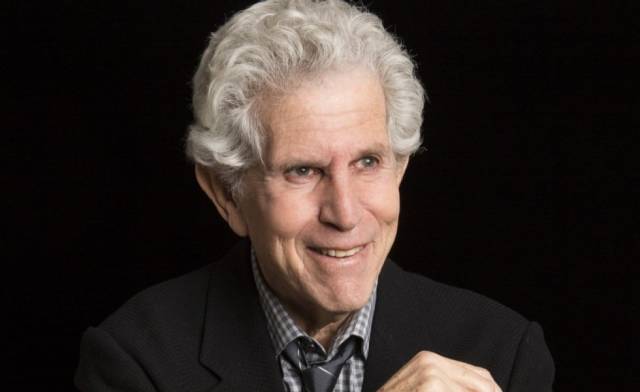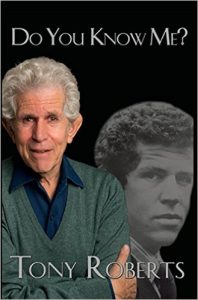
 Tony Roberts has been acting for over five decades, time during which he’s delivered memorable turns in the films of Woody Allen, and dazzling stage work in Promises, Promises and Barefoot in the Park, among others. Having worked with some of the best in the industry, Mr. Roberts sure has a lot of wonderful anecdotes and memories, and he’s decided to share the most meaningful of them in his autobiography, cheekily titled Do You Know Me? With stories about getting started in the business, to in-depth observations about the craft of acting, the book is informative, educational and also extremely entertaining.
Tony Roberts has been acting for over five decades, time during which he’s delivered memorable turns in the films of Woody Allen, and dazzling stage work in Promises, Promises and Barefoot in the Park, among others. Having worked with some of the best in the industry, Mr. Roberts sure has a lot of wonderful anecdotes and memories, and he’s decided to share the most meaningful of them in his autobiography, cheekily titled Do You Know Me? With stories about getting started in the business, to in-depth observations about the craft of acting, the book is informative, educational and also extremely entertaining.
We had the chance to speak to Mr. Roberts who discussed how he came up with the book’s amiable tone, shared his earliest Sondheim memory and commented on having worked under some of the best, but toughest, producers in the business.
You mention early in the book that you were obsessed with time. Was this what prompted you to write your memoirs?
Wow, what a great question. Yeah, time never stops, and we’re all trying to figure out what it all means in our lives. I guess I’m at a point in my life where I wanted to figure out what it was all about and why I did what I did. Writing became therapeutic in a way, there was a lot of stuff that I discarded, a lot of things I didn’t think anyone needed to know, and a lot of things I didn’t want people to know. I found myself writing about those things and when I read them back I saw them in a different light, whether I read them back a week later, or two years later, things I thought would be enlightening, turned out not to be.
It was a distilling process and to be honest with you I didn’t set out to write memoirs or a book, I set out to write individual articles about various experiences I’d had, which I thought were funny, or illuminating, or tragic, or whatever...and I couldn’t figure out how to link them all together. Until someone said to me, you know the five stages of an actor’s career don’t you? I said no, they said “who’s Tony Roberts? Get me Tony Roberts, get me a Tony Roberts type, get me a young Tony Roberts, who’s Tony Roberts?”, so obviously that spans a career and time doesn’t stop.
 I’m wondering if you wish one of those staged had lasted longer than the others? Do you miss people not knowing you and being surprised by what you can do for instance? Do you miss having your phone ring nonstop the most?
I’m wondering if you wish one of those staged had lasted longer than the others? Do you miss people not knowing you and being surprised by what you can do for instance? Do you miss having your phone ring nonstop the most?
It’s not something I think about, I’ve always thought if you live by the sword you die by the sword, meaning that if you went out of the house in the morning thinking that people should know who you are, you were going to be very disappointed if somebody didn’t. So I put that aside, I mean if I was a salesman in a stationary store, I wouldn’t take it personally if I wasn’t selling anything I particularly liked. There was a division there. Fame happens to you, there’s a great line in Shakespeare “some are born great, some become great and some have greatness thrust upon them”. That’s the way it was for me, it was thrust upon me, not that I didn’t want it or that it isn’t valuable, god knows it has its advantages, but fame was not the main inspiration, the inspiration was acting and what happens in a theater, or in a movie. You’re moved, you’re involved, you suspend your disbelief and you’re taken into another place. I wanted to do imaginary worlds that people would believe.
You mention how you were not able to be in an Oliver Stone film because people thought you’d be funny and they needed someone serious. Do you think the idea of typecasting has more to do with audiences or studios?
I think it’s the easiest way to cast a new project, to look for somebody that reminds them of what they’re looking for, so typecasting comes with the territory, if you are funny in a picture then somebody wants you to be funny in another picture, and usually in the same way. So you get a lot of offers whenever you do something that goes over well, that are very much like it, but usually not as good. The smarter actors who’ve had long, sustained careers have tried to make themselves to some extent multifaceted. Brando tried comedies, Paul Newman tried comedies, maybe they weren’t as good in those comedies as they were in dramas, but there were many other people onscreen who were funny and never got the chance to do anything serious. You’re always struggling against trying to repeat yourself.
I’d never spoken to you before now, and yet reading the book I felt like we were having a conversation. Did you find it easy to determine the tone you wanted to use on the book?
Thank you, I appreciate that. It took a long time, I wrote three versions of it throughout the years and I discovered I liked myself in some places, and didn’t like myself in some places (laughs) I figured, who needs to know the things I find now are too egotistical, I made a conscious decision not to be vengeful about anything, or to criticize people I’d worked with who I found to be less than wonderful. I edited the book in a way that keeps it moving forward, but includes the ups and downs, crazy events that have occurred and the surprise of becoming famous. It’s impossible not be slighted in certain instances when you’re not recognized, and on the other side sometimes you are very surprised to be recognized, especially if there’s famous people who are talking to you. You have no idea what it’s like for people to be sitting in a dark theater, watching you magnified and projecting their own ideas onto you. One has no privy to that.
David Merrick has gained a reputation for being almost tyrannical, but he undoubtedly was a creative genius. Do you find that history has been perhaps a little too unkind to him and Jerome Robbins because of how harsh they were?
Unkind to them? Well I don’t know about that (laughs) I’m not suggesting they couldn’t be kind, they were kind in many ways, but they were also very brutal in their ways. I don’t consider Merrick an artist, or a genius in that sense, his gifts were not on the creative side of things, he was a brilliant businessman and marketer, in that sense he was a genius. Robbins is a whole different story, his genius was his imagination and his creative energy which produced some of the greatest stuff we’ve had in theatre. He could also get very frustrated with his own failings, and that would play out in ways that were sometimes hurtful to other people who were trying to do their best, but who couldn’t satisfy his demands. His demands were too great even on himself, but those moments happened in rehearsal. If you met him in the street he was as sweet as you could be, but at work his standard was so high, and he was bored with what he’d done, he was constantly redirecting things.
You did Promises, Promises in London with Betty Buckley, the show has songs that became worldwide hits. Why do you think we don’t see that happen with Broadway shows nowadays?
Maybe one of the reasons is that we used to listen to the radio much more. During the golden age of Broadway radio would play songs from shows that people could become familiar with, or recording artists would record songs from shows that then would get played by DJs on AM radio. We don’t have that anymore, Jonathan Schwartz is the only guy who does that nowadays. Back then, there were more DJs doing that, and they played songs that people listened to even if they didn’t see the show. It happened with one of the shows I was in, How Now, Dow Jones, with the song “Step to the Rear”, which was recorded by I think Sinatra and a lot of other singers, so it became part of the culture. Nowadays maybe the music isn’t quite as accessible melodically, it’s not as easily absorbed. Some of Sondheim, which is magnificent, is beyond some people’s ability to hear back or to sing in their head.
You did Follies as well, how was it to work with him?
It was always my ambition to be in a Sondheim show, I’m a tremendous fan of his work and wanted to work for him, so being in the production I was in with an all-star cast including Ann Miller, Donna McKechnie and Larry Guittard, was a dream come true. Just to get to sing anything of his was a great opportunity. It’s funny, when I was a kid my family lived not far from where Stephen’s family lived in Stanford, Connecticut, and one night my parents came home from a party and my mother said “this amazing child about 12 years old came down the stairs to say goodbye to everybody, but before going to bed he sat down at the piano and played the complete ‘Rhapsody in Blue’ without any music in front of him”, it turned out that was Stephen Sondheim, I reminded him of that story when we were at the Paper Mill Playhouse and he said he remembered that. He was very fond of my dad, he remembered that, but as far as I was concerned it almost kept me from taking another piano lesson, I was quite discouraged (laughs).
It’s so interesting that you starred in two musicals based on Billy Wilder movies, Promises, Promises and Sugar, did you have a personal affinity with his work as well?
I never met him, and as a matter of fact I’d never even made that connection before, you’re the first person to ever point that out. That’s interesting, I never put that together before.
Oh really? I thought it’d been on purpose because The Apartment and Some Like It Hot even came out back to back, I thought maybe you were doing chronological Wilder musicals!
Wow, wouldn’t that be something? It would be fun! They also did Sunset Blvd. I was never in it, but that’s three great musicals from Wilder movies.
Maybe we can get them to do another so you can be in it.
Yeah! (Laughs)
Do You Know Me is available in stores and on Amazon.com and Audible.com.